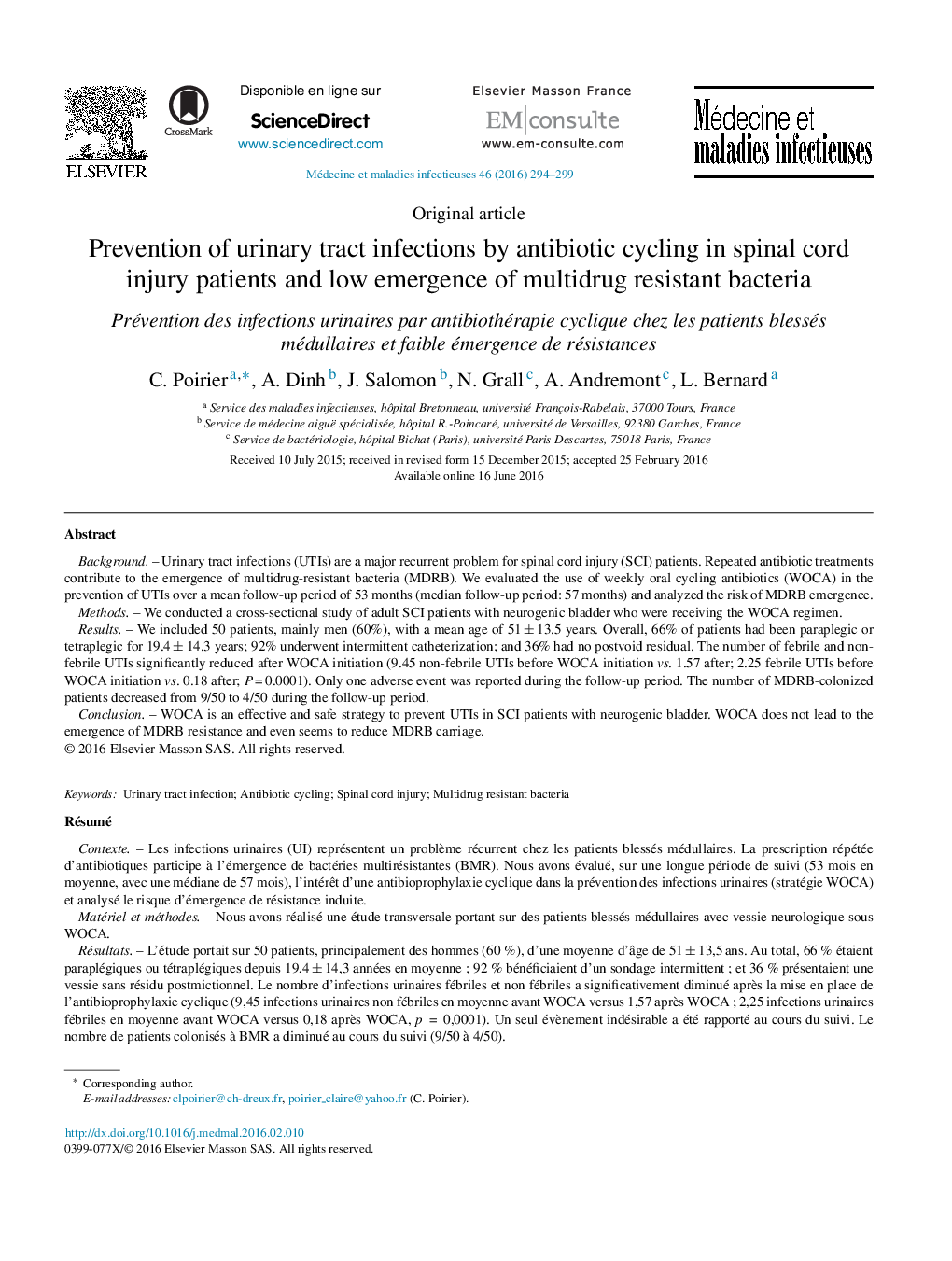| کد مقاله | کد نشریه | سال انتشار | مقاله انگلیسی | نسخه تمام متن |
|---|---|---|---|---|
| 3412243 | 1408187 | 2016 | 6 صفحه PDF | دانلود رایگان |
BackgroundUrinary tract infections (UTIs) are a major recurrent problem for spinal cord injury (SCI) patients. Repeated antibiotic treatments contribute to the emergence of multidrug-resistant bacteria (MDRB). We evaluated the use of weekly oral cycling antibiotics (WOCA) in the prevention of UTIs over a mean follow-up period of 53 months (median follow-up period: 57 months) and analyzed the risk of MDRB emergence.MethodsWe conducted a cross-sectional study of adult SCI patients with neurogenic bladder who were receiving the WOCA regimen.ResultsWe included 50 patients, mainly men (60%), with a mean age of 51 ± 13.5 years. Overall, 66% of patients had been paraplegic or tetraplegic for 19.4 ± 14.3 years; 92% underwent intermittent catheterization; and 36% had no postvoid residual. The number of febrile and non-febrile UTIs significantly reduced after WOCA initiation (9.45 non-febrile UTIs before WOCA initiation vs. 1.57 after; 2.25 febrile UTIs before WOCA initiation vs. 0.18 after; P = 0.0001). Only one adverse event was reported during the follow-up period. The number of MDRB-colonized patients decreased from 9/50 to 4/50 during the follow-up period.ConclusionWOCA is an effective and safe strategy to prevent UTIs in SCI patients with neurogenic bladder. WOCA does not lead to the emergence of MDRB resistance and even seems to reduce MDRB carriage.
RésuméContexteLes infections urinaires (UI) représentent un problème récurrent chez les patients blessés médullaires. La prescription répétée d’antibiotiques participe à l’émergence de bactéries multirésistantes (BMR). Nous avons évalué, sur une longue période de suivi (53 mois en moyenne, avec une médiane de 57 mois), l’intérêt d’une antibioprophylaxie cyclique dans la prévention des infections urinaires (stratégie WOCA) et analysé le risque d’émergence de résistance induite.Matériel et méthodesNous avons réalisé une étude transversale portant sur des patients blessés médullaires avec vessie neurologique sous WOCA.RésultatsL’étude portait sur 50 patients, principalement des hommes (60 %), d’une moyenne d’âge de 51 ± 13,5 ans. Au total, 66 % étaient paraplégiques ou tétraplégiques depuis 19,4 ± 14,3 années en moyenne ; 92 % bénéficiaient d’un sondage intermittent ; et 36 % présentaient une vessie sans résidu postmictionnel. Le nombre d’infections urinaires fébriles et non fébriles a significativement diminué après la mise en place de l’antibioprophylaxie cyclique (9,45 infections urinaires non fébriles en moyenne avant WOCA versus 1,57 après WOCA ; 2,25 infections urinaires fébriles en moyenne avant WOCA versus 0,18 après WOCA, p = 0,0001). Un seul évènement indésirable a été rapporté au cours du suivi. Le nombre de patients colonisés à BMR a diminué au cours du suivi (9/50 à 4/50).ConclusionL’antibioprophylaxie cyclique est une stratégie efficace dans la prévention des IU chez les patients blessés médullaires avec vessie neurologique et n’induit pas l’émergence de résistance bactérienne, voire en diminue le portage.
Journal: Médecine et Maladies Infectieuses - Volume 46, Issue 6, September 2016, Pages 294–299
